Discover the power of AI for E-commerce to improve marketing, automate customer interactions, and boost sales.

In today’s rapidly expanding e-commerce landscape, standing out online is no longer a luxury - it’s a necessity, especially for small businesses.
The global marketplace is fiercely competitive, and to thrive, online stores need to leverage every advantage they can get. AI is a game-changing technology that’s becoming increasingly accessible and affordable, even for businesses on a tight budget.
This article will serve as your starting point to understand how to effectively use AI tools for e-commerce to not just compete but excel.
The E-commerce Revolution with AI
The digital marketplace is booming. Consumers are increasingly turning to online shopping for convenience, variety, and competitive prices.
For small businesses, this presents an unprecedented opportunity to reach a global audience. However, this also means facing competition from giants with vast resources. To level the playing field, small online businesses need to work smarter, not just harder. This is where AI comes into play.
Artificial intelligence is no longer a futuristic concept reserved for tech giants. It’s now a practical and budget-friendly toolkit that can empower online stores of all sizes to enhance customer experiences, streamline operations, and boost e-commerce sales. Let’s explore how.
Also Read👇
Crafting Personalized Shopping Experiences with AI
In the age of mass customization, generic shopping experiences simply don’t cut it. Customers expect to feel understood and catered to. Personalized online stores allow you to create shopping journeys that resonate with each individual customer, fostering loyalty and driving conversions.
How AI helps personalize your online store:
How AI helps personalize your online store:
1. Dynamic Content Personalization:
AI, especially AI Content Generation tools like Jasper or Wiser, can analyze customer behavior - Browse history, purchase patterns, and demographics - to dynamically display website content. Imagine a returning customer being greeted with products they previously showed interest in, or new visitors seeing content tailored to their location or browsing behavior.

For Example: Website banner text and image suggestions for returning customers interested in ‘Office Arm Chair’. Focus on highlighting top rated and special offers within this category.”
Try it yourself! Copy this prompt and paste it into an AI content generation tool like Jasper or Wiser, to see the kind of personalized banner text you can generate. But be sure to adjust the prompt to specify tone, length, and target audience further.
2. Personalized Email Marketing:
AI Email Marketing platforms can segment your email list based on customer preferences and behaviors, enabling you to send highly targeted email campaigns. Forget generic newsletters; think of personalized product recommendations, tailored promotions, and content that truly speaks to each subscriber.
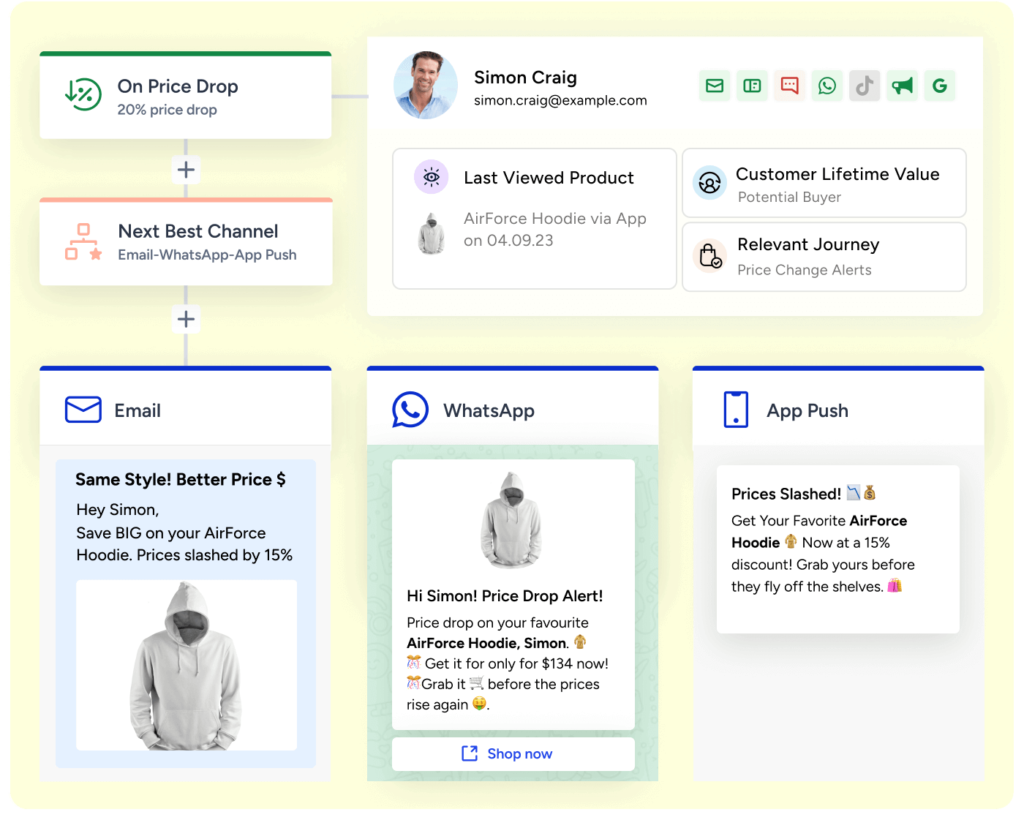
Prompt to try: “Write a personalized email for customers who have previously viewed ‘AirForce Hoodie’ product. With include a 20% price drop.”
Try it yourself! If you use an email marketing platform like Sirius-AI or Mailchimp that offers AI features, try adapting this prompt within their AI writing assistants to draft personalized emails. You can refine the prompt by specifying the desired email tone (e.g., friendly, professional) and length.
3. Tailored Search Results:
AI-powered search within your online store can understand the needs of customer queries, going beyond simple keyword matching. It can learn from past searches and preferences to deliver more relevant and personalized product results. Many e-commerce platform extensions, like Algolia or Searchspring, offer AI-enhanced search capabilities.
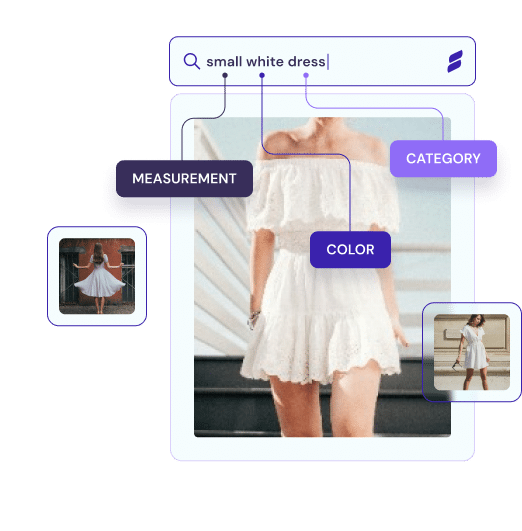
For Example: Analyzing customer search queries related to ‘small white dress’. Identify common search patterns and suggest improvements to product tagging and categorization to enhance search relevance inside the website.
Think about it: While you might not directly “prompt” Algolia or Searchspring with text, understanding the type of analysis they perform (like in the above example) helps you leverage their features effectively. You would typically configure these tools to analyze your store’s search data and then implement their recommendations for tagging and categories within your e-commerce platform’s backend.
AI Product Recommendations: Driving Sales Through Smart Suggestions
One of the most powerful applications of e-commerce is AI product recommendations. By intelligently suggesting products that customers are likely to buy, you can significantly increase average order value and overall sales. Platforms like Nosto or Rebuy specialize in this.
How AI powers product recommendations:
How AI powers product recommendations:
1. Collaborative Filtering:
AI algorithms analyze the purchase history and browsing behavior of many customers to identify patterns and recommend products that are frequently bought together or viewed by similar users. “Customers who bought X also bought Y” - this is collaborative filtering in action.
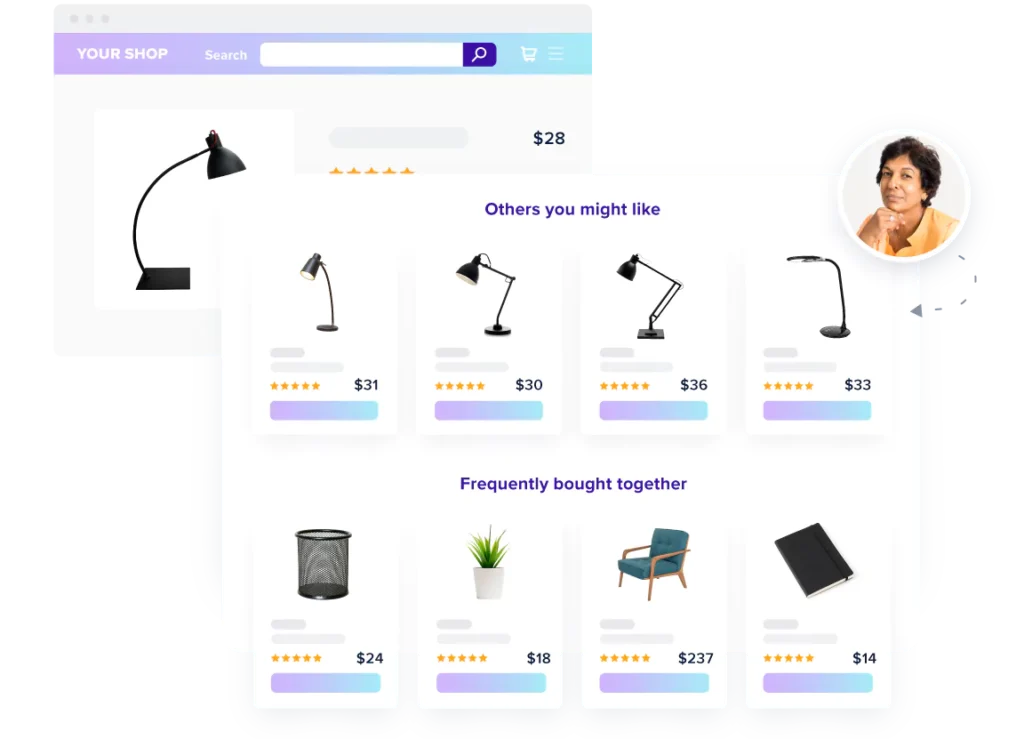
Prompt to try: “Create a ‘Recommended for You’ carousel for the homepage of our online store. Use AI to personalize product suggestions based on Browse history and past purchases.”
Consider this: When using platforms like Nosto or Groupby, you often set up rules and parameters within their dashboards. This prompt helps you think about the logic you want to implement in those rules - e.g., focusing on specific product categories for “Frequently Bought Together” recommendations.
2. Content-Based Recommendations:
AI analyzes product descriptions, attributes, and categories to recommend items that are similar to what a customer is currently viewing or has purchased in the past. If a customer is looking at a Training T-shirt, AI can recommend other Training T-shirts, in different colors or similar styles.
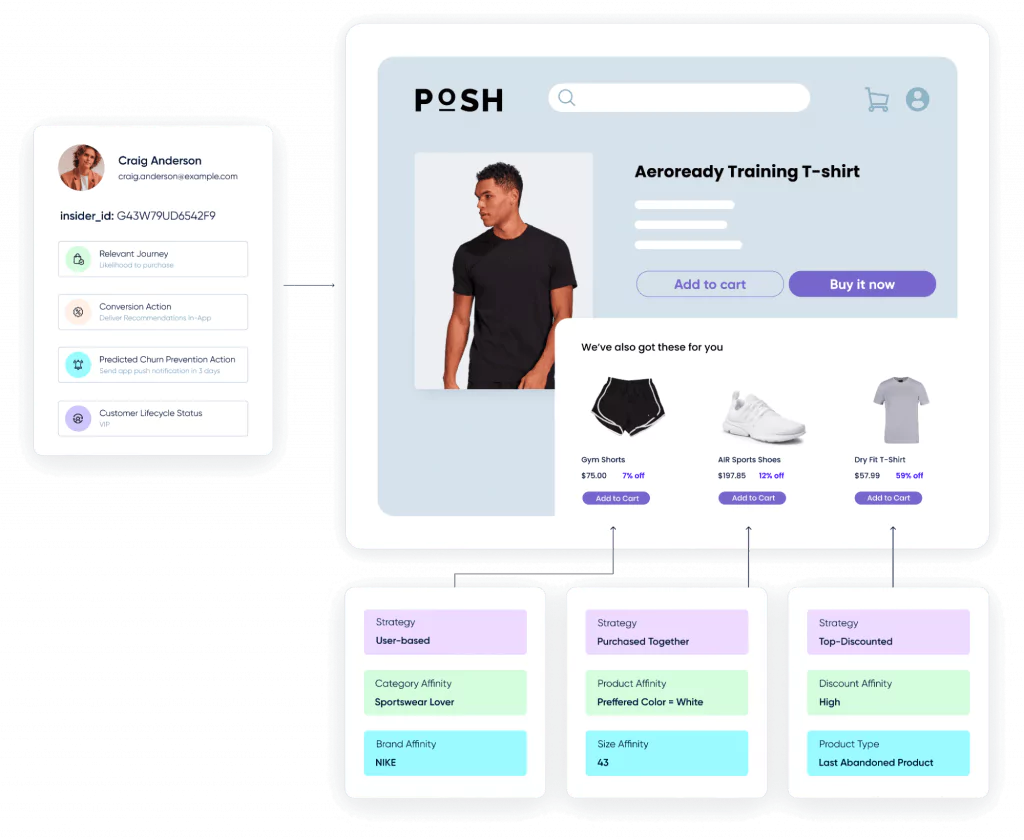
For Example: Similar Items recommendations for products in the ‘Training T-shirt’ category. Focus on recommending items with similar materials, styles, and price points.
Think about it: Similar to collaborative filtering, you would configure content-based recommendations within platforms like Nosto or Rebuy. This prompt helps you define the criteria for “similarity” - in this case, materials, styles, and price - which you would then translate into rules within the platform.
3. Personalized Recommendation Carousels:
AI dynamically populates product carousels on your website - on the homepage, product pages, and even in the shopping cart - with recommendations tailored to each visitor. Platforms like Nosto and Rebuy excel at creating these dynamic carousels.
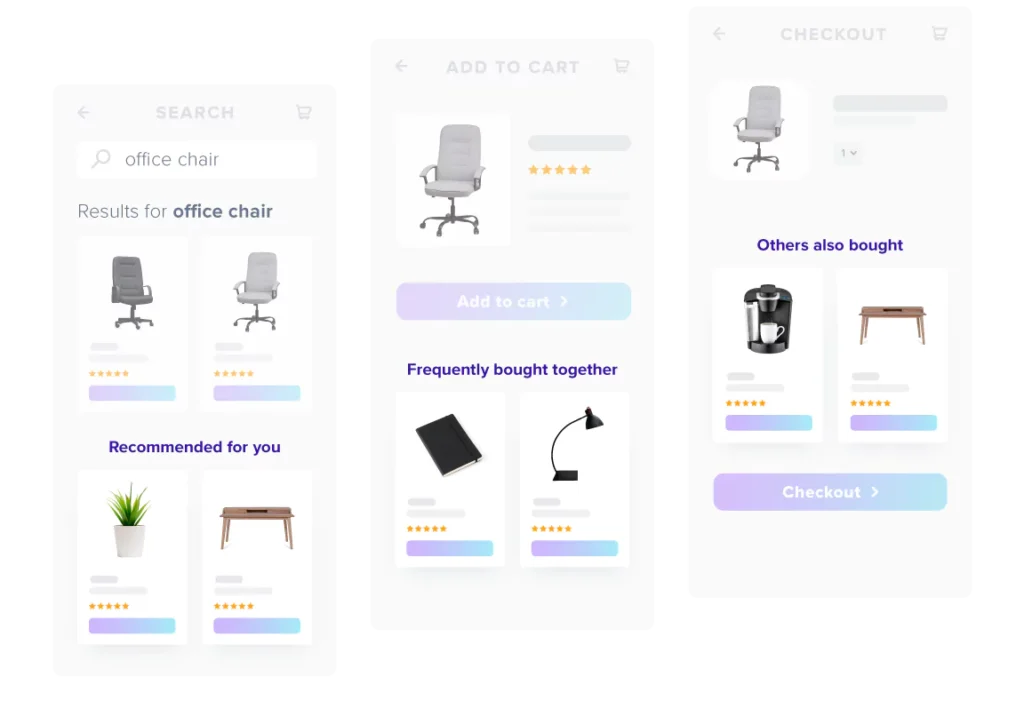
For Example: Customers viewing ‘Office Arm Chair’. Prioritize items from the ‘office setup’ and ‘Indoor decor items’ categories.
Visualize: Imagine using Nosto or Rebuy’s visual interface. This prompt outlines the goal of the carousel. You would then use the platform’s tools to select the carousel type, placement (homepage), and the AI algorithms to drive the personalization (Browse history, past purchases).
AI Chatbots for E-commerce: Instant Customer Service, 24/7
In today’s fast-paced world, customers expect immediate support. AI chatbots provide instant customer service, answering questions, resolving issues, and guiding shoppers 24/7, even when you’re not online. Platforms like Tidio or ManyChat offer user-friendly chatbot solutions.
How AI chatbots enhance customer service:
How AI chatbots enhance customer service:
1. Instant Answers to FAQs:
AI chatbots, especially those on platforms like Tidio or ManyChat, can be trained to answer frequently asked questions about shipping, returns, product details, and more, freeing up your customer service team to handle more complex issues.
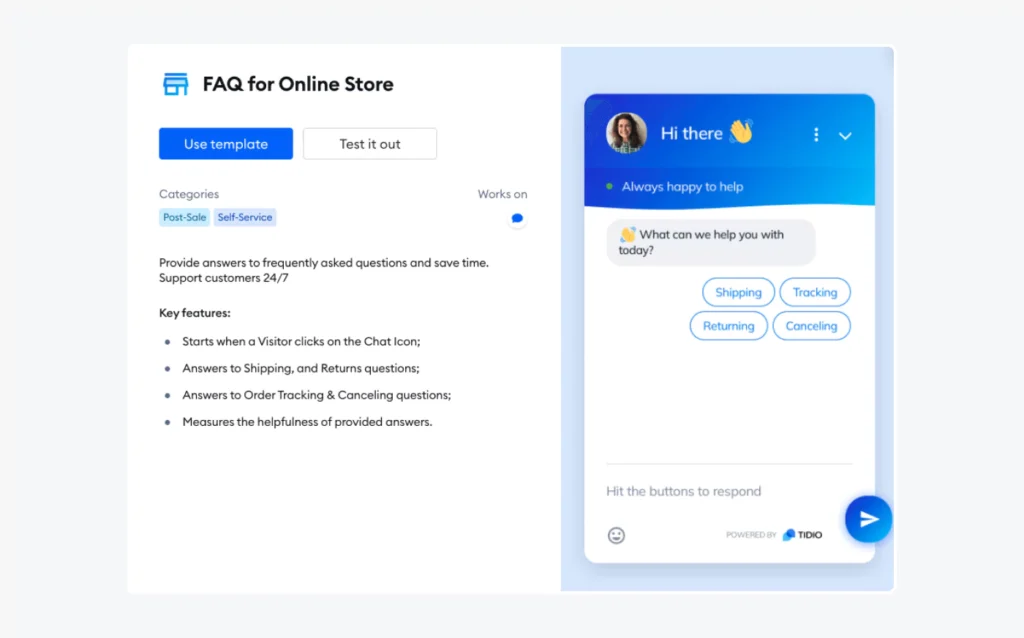
For Example: “Train the chatbot to answer questions about our ‘shipping policy,’ ‘return process,’ and ‘product warranty.’ Provide the chatbot with links to relevant policy pages on our website.”
Try it yourself! If you are setting up a chatbot on Tidio or ManyChat, you would use their interfaces to “train” the bot. This prompt helps you define the content for that training , specifically, the FAQs related to your policies. You would then input these FAQs and their answers into the chatbot platform’s training section.
2. Order Tracking and Updates:
Chatbots can provide real-time order status updates, tracking information, and estimated delivery times, reducing customer anxiety and inquiries.
- Integrate the chatbot with our order management system to allow customers to track their order status by entering their order number.
- You would need to use Tidio or ManyChat’s API documentation or integration guides to connect your order management system to the chatbot. This might require some technical setup or the use of integration platforms like Zapier.
AI for Inventory Management and Demand Forecasting: Smart Stock Control
Efficient inventory management is crucial for profitability. AI can offer powerful tools for inventory management and demand forecasting, helping you optimize stock levels, minimize waste, and meet customer demand effectively.
How AI optimizes inventory and forecasting:
1. Demand Prediction:
AI Demand Forecasting tools like Inventory Planner or Lokad analyze historical sales data, seasonal trends, market events, and even social media sentiment to predict future demand for products. This allows you to proactively adjust inventory levels and avoid stockouts or overstocking.
For Example: Analyze the past 3 years of sales data for our ‘summer clothing’ category, considering seasonal trends and upcoming holidays. Forecast demand for the next quarter and suggest optimal inventory levels for each product.
Data Input: Tools like Inventory Planner and Lokad require you to upload your sales data. This prompt describes the type of analysis you want the tool to perform on that data , focusing on historical sales, seasonality, and forecasting for a specific category. You would then use the tool’s interface to specify the data range, product categories, and forecasting parameters.
2. Automated Inventory Replenishment:
AI Inventory Management Systems can automatically trigger reorder points based on predicted demand, lead times, and desired safety stock levels, ensuring you always have the right products in stock without manual monitoring.
For Example: Set up automated reorder points for ‘best-selling t-shirts’. Configure the system to trigger reorders when stock levels fall below a 2-week supply, considering a 1-week lead time.
Configuration within the Tool: In Inventory Planner, you would use this as a guide to configure the system’s settings. You’d input the lead time (1 week), and desired safety stock (implicitly defined by “2-week supply”), and specify that this rule applies to “best-selling t-shirts.” The AI then uses demand forecasts to calculate reorder points dynamically.
3. Trend Analysis and Adaptation:
AI trend analysis features within platforms continuously monitor market trends, competitor activity, and customer preferences, providing insights into emerging product categories and shifting demand patterns. This allows you to adapt your product offerings and stay ahead of the curve.
For Example: Analyze current social media trends and e-commerce reports to identify emerging product categories in the ‘home decor’ market. Suggest potential new product lines to add to our online store.
Exploration and Reporting: Tools like Lokad and market research platforms often provide reports and dashboards. The above example describes the type of analysis you are seeking. You would use the platform’s features to explore market data, social media trends, and potential competitor data to identify emerging opportunities in the “home decor” market, then look for reports or visualizations that highlight potential new product lines.
Affordable and Accessible AI Platforms for Small Online Businesses
The best news? You don’t need a massive tech budget to access the power of AI for e-commerce. Numerous affordable and accessible AI platforms for small online businesses are now available, offering user-friendly interfaces and pricing plans tailored to smaller operations.
As we have already discussed in detail above, the AI tools by their capabilities and usage. But here we have mentioned the same AI for quick access.
Examples of Budget-Friendly AI Platforms (Always check for up-to-date pricing and features):
1. For Product Recommendations & Personalization:
- Nosto: Offers personalized product recommendations, content personalization, and behavioral pop-ups. Known for its ease of use and scalability.
- Rebuy: Focuses on AI-powered cross-selling and upselling to increase order value. Integrates with popular e-commerce platforms.
2. For AI Chatbots:
- Tidio: Provides live chat and AI chatbot solutions with free and paid plans. Easy to set up and integrate with websites.
- ManyChat: Popular for Facebook Messenger and SMS chatbots, offering automation and marketing features.
3. For Inventory Management & Demand Forecasting:
- Inventory Planner: Specializes in demand forecasting and inventory optimization for e-commerce businesses. Integrates with various platforms.
- Lokad: Offers advanced forecasting and inventory optimization solutions, with scalable pricing.
Getting Started with AI in Your Online Store:
- Identify Key Areas: Pinpoint the areas in your online store where AI can make the biggest impact. Is it personalization, product recommendations, customer service, or inventory management?
- Start Small: Choose one or two AI tools to begin with. Focus on implementing them effectively and measuring their results.
- Explore Free Trials and Plans: Many AI platforms offer free trials or basic free plans, allowing you to test the waters before committing to a paid subscription.
- Monitor and Optimize: Continuously track the performance of your AI tools and make adjustments as needed to maximize their effectiveness.
Conclusion
“AI for e-commerce is no longer a futuristic dream - it’s a present-day reality that can empower small online businesses to achieve significant growth and success. By strategically implementing AI tools in e-commerce for personalization, AI product recommendations, AI chatbots, and inventory optimization, you can personalize your online store, boost e-commerce sales, and create a thriving online business that truly resonates with your customers.
Start exploring these affordable AI platforms today and unlock the full potential of your online store in the exciting world of e-commerce!”
Disclaimer: Please note that AI tool features and pricing can change rapidly. Always verify the latest information on the provider’s website before making any decisions. There are many other AI tools available, and the best choice will depend on your specific business needs and budget.




